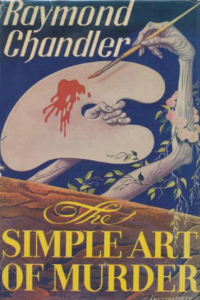What We’re Loving — May 2014


Raymond Chandler may be known for his noir novels, but sometimes his short stories are even better — which is funny because his novels are really amalgamations of various short stories of his. This effect means that the plot can get quite convoluted, as evidenced by his novel The Little Sister, in which detective Philip Marlowe contends with not one, not two, but three femme fatales. That’s a bit much, but that problem is not as evident in his short stories. What’s more fascinating about his collection The Simple Art of Murder is that many of his stories are in third person — a departure from his typical first-person Marlowe voice of colorful and hilarious metaphors (“He looked about as inconspicuous as a tarantula on a slice of angel food cake.” -Farewell, My Lovely). Instead we are graciously exposed to Chandler’s precise, descriptive prose and devastating final lines (“When they were a long way from [the house], Delaguerra opened his eyes again” — “Spanish Blood”). Though the “art of murder” and telling compelling detective fiction is anything but simple, Chandler makes it look easy.
— Harrison Blackman

Lately, I’ve been listening, perhaps obsessively, to Tame Impala’s Lonerism. Released in 2012, the album is undoubtedly some of the best psych-rock the world has seen since its heyday in the 60s. It remains true to the spirit of the genre, incorporating extensive guitar effects and (drug-)inspired instrumental solos. But it also is a distinctly modern album, one with an apparent passion for the possibilities of electronic music. As the band’s frontman, Kevin Parker, has said, “you can layer your own voice 700 times for half a second if you want, and I just love that kind of music.” The songs are intricate and beautiful, spanning from the slow, hazy crooning of “Feels Like We Only Go Backwards” to the pounding, exuberant intensity of “Elephant,” to the weird, exuberant poetry of “Nothing That Has Happened So Far Has Been Anything We Could Control.” The songs are, as the album’s title suggests, highly introspective, with a focus on the hardships and futility inherent to relationships. But don’t let that get you down too much, because they’re also fun. There’s a noticeable pop element on the album, more approachable by far than its predecessor, Innerspeaker. The album is truly special because of its ability to mesh these pop influences with psych-rock, producing music that can be contemplated as much as enjoyed.
— Elliott Eglash

As I listened to “Sing,” Ed Sheeran’s latest single, for the first time, I found myself tapping my foot along with the beat before twenty seconds of Spotify-green-line time had gone by. As “Sing” begins, quick, repetitive guitar chords backed by a low bass melody and synthetic drums form an intro that is going to get stuck in your head, regardless of whether you like the song or not. For most of the sung portion of the song, the beat drops out to allow Sheeran and his guitar a chance to convince the listener they don’t need accompaniment. Sheeran sings the chorus, “I need you darlin’/ come on set the tone/ if you feel you’re fallin’/ won’t you let me know,” in the upper register of his voice that is barely recognizable as the voice we know to be his. Lyrically, the song expresses Sheeran’s typical longing for an imaginary female subject, yet his characteristic “on-the-verge-of-tears-because-I-love-you” tone has been entirely replaced by a faced-paced, endearing falsetto that is, in short, much less depressing than usual.
Like most of us who have suffered through “ The A-Team” a few too many times, I was extremely skeptical when someone told me that the voice in “Sing” belonged to Ed Sheeran. But when I looked up the song and found out that “Sing” is the first collaboration between Sheeran and seven-time Grammy-award winning producer and musician, Pharrell Williams, everything suddenly made sense. The falsetto, the repetition, the simple, catchy refrain are all qualities unique to Pharrell’s sound, and which have made songs like “Get Lucky” and “Happy” world-wide hits. Although right now I enjoy listening to “Sing,” like many Pharrell songs it strikes me as something I’ll hear enough times that I will eventually skip over when it comes up on my Pandora. Still, “Sing” demonstrates Pharrell’s immense talent as a producer, and Ed Sheeran’s entirely new sound demonstrates the immense impact that a producer can have on the way an artist uses his or her voice. Of course it is still too early to say whether Sheeran will break through into the hip-hop/funk genres, or if Pharrell is the sole reason for his newfound groove. But it is clear that Sheeran is developing a sound that will not inevitably cause an emotional listener to tear up — which, in my opinion, can only be a good thing.
— Clara Wilson-Hawken